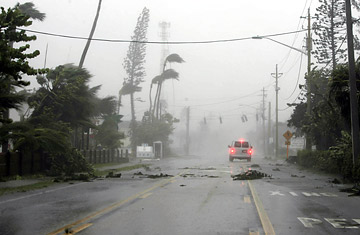
A van drives down a boulevard during Hurricane Wilma in Ft. Myers, Florida in 2005.
The 2008 hurricane season starts Sunday, and if you're looking for a long-term storm forecast you can ask the Colorado State University Department of Atmospheric Science. Or you can ask someone like Bing, an elderly gentleman who used to cut lawns in my neck of Miami. Each year Bing would tell us what kind of hurricane season to expect. The key to his method was May: if it was a hot dry one, we'd better break out the window shutters; if it was cool and rainy, he'd tell us to relax. And he was usually right, especially in 2004 and 2005, when Florida got pummeled by enough hurricanes to blow Humphrey Bogart and Lauren Bacall off Key Largo forever.
And what about the scientists at Colorado State, considered one of the nation's premier hurricane forecast labs? In 2006 and 2007 they warned of unusually bad storm seasons, but both years turned out to be unusually calm. This year they see another depressing spate of depressions on the Atlantic horizon. Their latest forecast calls for 15 tropical storms, eight hurricanes and four strong hurricanes; a normal year sees about two-thirds of that activity. They might, of course, be proved right, but given their recent track record they also run the risk of crying wolf, which is part of the reason why the denizens of Florida and the rest of America's hurricane-prone coastline are largely shrugging. A Mason-Dixon poll of Atlantic coastline dwellers released this week reveals, astonishingly, that more than half don't feel vulnerable to hurricanes.
This is Hurricane Preparedness Week, and although Florida Governor Charlie Crist is touring the peninsula, urging folks to stock up on Spam in case a big one knocks out the electric stove, you'd be hard-pressed to find Miamians shaking in their flip-flops. The bottom line for civilians like me is that while we appreciate the climatologists' efforts, these long-term forecasts have often ended up causing more confusion or complacency than preparedness. And now, to make the outlook even cloudier, we have a new study debunking the idea that global warming is intensifying hurricane activity — a study written, naturally, by one of the very scientists who not long ago backed that theory.
In the June issue of the journal Nature Geoscience, Tom Knutson of the National Oceanic & Atmospheric Administration questions whether we're seeing "a really dramatic increase in Atlantic hurricane activity resulting from greenhouse warming." Quite a few of Knutson's colleagues in turn are questioning him and the computer models he's using to make this about-face. But for those of us who aren't in the eye of that scientific storm, it only raises the issue of whether predicting hurricanes is really any more reliable than forecasting earthquakes.
And yet the practice has very real effects. Despite the fact that the Colorado forecasts have been unreliable of late, the insurance industry still uses them as gospel to make their own calculations. That has contributed to the skyrocketing windstorm premiums that have forced many Florida residents to leave the state. For the past two years the South Florida Water Management District, reacting to the diluvial warnings, has drained water from Lake Okeechobee, one of the peninsula's most vital hydrosources, to avoid storm flooding. Because the deluges never came, this has helped exacerbate Florida's recent drought.
None of this is to be confused with hurricane tracking, whose famous "cone of probability" has indeed become a dependable asset to those of us in a storm's path. The accuracy with which the National Hurricane Center here in Miami now forecasts a storm's strength as well as the time and place of its arrival, not just hours but days in advance, is a tribute to turn-of-the-century advances in meteorological spy hardware. But until seasonal forecasts like Colorado State's become more consistent, the best we can do during Hurricane Preparedness Week is just accept the fact that between June 1 and November 30, anything can happen. As for asking Bing, he recently moved to Kansas City, where he can now use his talents to predict tornadoes. Back here in Florida, it's been a mostly hot, dry May, which means I'm keeping the shutters close at hand.
